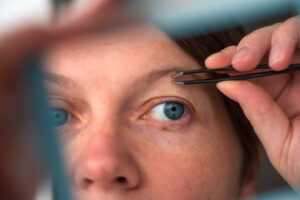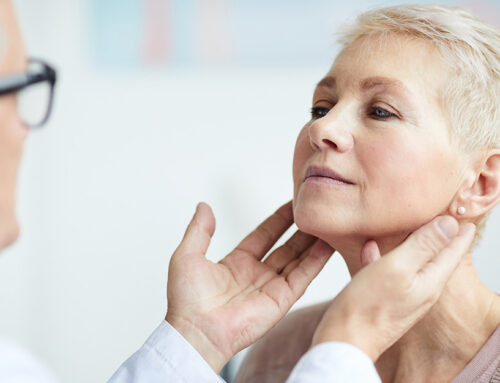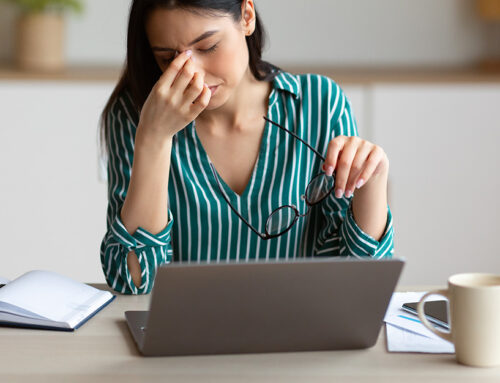7 Ways to Stop Eyebrow Hair Loss
“Mirror, mirror on the wall, will my eyebrows return at all?” If Snow White had thyroid and hormone issues, she’d probably be humming this panicky tune.
Tweezers not getting the use they once did? Learn the reasons why your eyebrows may be MIA. In addition, equip yourself with ways to get things growing again with 7 ways to stop and reverse eyebrow hair loss.
Why Eyebrow Health is Important
Investigating eyebrow hair loss isn’t a vanity. Those sparse brows are reflective of a deeper issue. Getting to the root of why you’re losing hair means getting to the bottom of your underlying health condition.
Hair loss may be more common than you think. Around 21 million US woman are estimated to experience some sort of hair loss. So let’s cut any renditions of the “You’re So Vain” song track that may be rolling around in your brain. Take a look at how to optimize the health of that hair on your brow.
What Causes Eyebrow Hair Loss?
If you’ve got a hunch your thyroid could have something to do with your eyebrow health, you’re 110% right. In addition, there could be other factors at play. Imbalanced hormones, toxins, improper nutrition and stress could all be playing a role in your thyroid health, and by extension eyebrow health.
An Underactive Thyroid
One of the classic signs of an underactive thyroid is hair loss, especially on the outer ⅓ of your eyebrow. It may even be the first clue that your thyroid is off.
When you’re not producing enough thyroid hormone, your poor little hair follicles aren’t stimulated as much as they really need to be.Translation: your hair stops growing, and your hair falls out. It happens to your eyebrow hairs just like your head hair.
“But, I’m on thyroid meds!” you wail. “Why are my eyebrows still falling out?!” Sadly, this happens.
For one, you may not be taking enough thyroid meds to address the hair loss. Second, the thyroid medicine ingredients may be causing your hair loss.
Some Thyroid Medications
Do you take Levothyroxine (perhaps better known by its brand name Synthroid)? Guess what’s listed under adverse reactions on the prescribing information page? If you guessed hair loss, you’re right! One of the side effects of taking this thyroid medications is hair loss, which can include the hair that makes up your brows!
What’s the solution? Consider a natural dessicated thyroid medication. These were the norm before synthetic thyroid medication became available in the 1950’s. Natural dessicated thyroid medications (including Nature Throid, WP Thyroid and Armour) contain both active thyroid hormone (T3) and inactive thyroid hormone (T4).
This combo can come in quite handy. Your body needs to be able to turn inactive thyroid hormone to activated thyroid hormone to do all the groovy things it was designed to do–including making your hair grow. If you’re taking a T4-only containing medication like Synthroid and your body has trouble changing the T4 over to active T3, your eyebrows may suffer.
This hiccup in the converting of T4 to T3 can be caused by many factors, including, but not limited to:
-
- Chronic stress: High cortisol tells thyroid hormones to take a hike.
- Inflammation: This could be a food intolerance, a gut infection or a toxic exposure.
- Neurotransmitter deficiencies: Not enough serotonin and dopamine can make brain-thyroid communication sluggish.
- Congested liver: As our primary detoxification organ, the liver has a large workload including its critical job in converting T4 to T3, the active thyroid hormone.
Gut and Liver Problems
Gut and liver health are at the top of the must-have list for producing that active T3. If you’ve got less than stellar liver enzymes, a sad congested liver, or a holey, leaky gut, you probably aren’t getting the T3 you–or your eyebrows–need.
Toxins and Your Liver
The CDC’s 2009 report on chemical exposure found widespread exposure to Bisphenol A (found in shopping receipts and plastic food containers), fire retardants (which like to hang out in fat tissue), and perfluorinated chemicals like the polymer that makes nonstick pans. That’s only scraping the surface of the toxic soup we called planet earth.
Whenever we touch, breathe or otherwise get close to any type of environmental toxin, our livers get to work. Not surprisingly, our livers have to work extra-hard these days to keep up with our increased environmental load of toxic exposures. All this gunk can take a toll on our livers and by extension our thyroids.
Intestinal Permeability and Autoimmunity
If you’ve got Hashimoto’s or another autoimmune disease, the chances are you’ve got holes in your gut. This means less thyroid hormone and a greater chance of eyebrow loss.
Known as intestinal permeability or leaky gut, this condition allows undigested food particles, toxins and a host of other things that should stay inside the intestinal tract out into the bloodstream. This is bad news bears for your body, leading to a host of symptoms, and eventually may lead to autoimmunity.
Since around 20 percent of thyroid hormone is changed off from T4 to T3 in your intestinal tract, it makes sense to keep it happy and leaky-gut-free.
Inflammation in the gut also raises cortisol, further reducing T3, that eyebrow-growing, active thyroid hormone.
Plus, if your gut is leaky, it’s not absorbing nutrients the way it needs. This can lead to nutrient deficiencies that may also contribute to eyebrow hair loss.
Vitamin A and zinc are important for eyebrow health as well as B vitamins, including B7 (biotin). Getting enough choline–found in eggs–may also help thinning hair.
Menopause or Perimenopause
While you may have come to grips with the fact “the change” will change your life, you may not have connected the dots between the alterations in how your body manufactures sex hormones to your eyebrows during menopause and perimenopause.
Hair loss in perimenopausal and menopausal women is due to dwindling levels of estrogen. This gets tricky since one of estrogen’s jobs is to dampen the effects of testosterone. Without enough estrogen, the sex hormone dihydrotesterone (DHT) is produced in the liver.
Think your liver looks more like a 5:00 p.m. traffic jam than the merrily humming detoxification allstar it’s meant to be? Then Houston, we have a problem. A congested liver means excess DHT is produced.
And, wouldn’t ya know, DHT is the culprit of the making your hair disappear from your head and eyebrows and making it appear on places like your chin. Sigh.
An overburdened liver also means you’re probably not getting adequate thyroid hormone conversion.
Polycystic Ovarian Syndrome (PCOS)
Polycystic Ovarian Syndrome is another way hormones can cause eyebrow loss. One out of 10 women of childbearing age has PCOS. In this condition, benign cysts may occur on the ovaries. This causes an increase in testosterone and insulin surges. What that means is your hormones may cause an array of symptoms ranging from hair loss and acne to infertility.
What’s a gal to do? For starters, ditch a high-carb diet. This helps stabilize blood sugar, preventing high glucose, insulin and estrogen.
7 Ways to Stop Eyebrow Hair Loss
To help out your lil’ brows, you’ll want to support you entire body, especially your thyroid. Here’s six ways you can stop eyebrow hair loss and encourage regrowth.
1. Test and Treat Your Thyroid Wisely
If your doc is just running the traditional TSH lab for your thyroid function, you’re not dealing with all the data! Get a full thyroid panel which including Free T4, Free T3, Reverse T3, and all thyroid antibodies. You’ll want both TPO (thyroid peroxidase antibody) as well as TGAb (thyroglobulin antibody).
Once you have the correct labs, being evaluated through the lens of functional lab ranges, you’ll have a better idea of how your thyroid is actually functioning. It’s totally possible to have a “normal” thyroid by conventional testing and yet have an underactive thyroid and fading eyebrows.
From there, you’ll want to be sure you have the best treatment. Since converting inactive T4 to T3 is such a challenge for so many, a natural dessicated thyroid medication may be a better choice over the standard, potentially hair loss-causing, synthetic T4.
Also, be aware, if you have too much thyroid medication, it can make your eyebrow hair loss worse!
2. Know Your Food Sensitivities
What you eat affects your thyroid function. Discovering and addressing food sensitivities can be one of the biggest tools in the Hashimoto toolkit! Aim for a real food diet. Toss out those processed, packaged foods.
The biggest food offenders for Hashimoto’s patients are gluten, dairy and sugar. But the saying “Test, don’t guess” has so much merit! You may be surprised what seemingly healthy foods are a threat.
Just check out this story of this patient whose hair started growing back after we discovered her food sensitivity to lettuce!
3. Consider Hair Regrowth Supplements
Your eyebrows and the hair on your head need specific nutrients to grow. Strategic supplementation of biotin, silicon and choline may be beneficial. These nutrients will give your body the building blocks it needs to create collagen–an essential for hair growth.
You may find benefit from other supplements including collagen, zinc, primrose oil, and B vitamins, as well.
4. Check on Your Iron
Proper iron levels and optimal thyroid function are both need for hair growth. Iron-depleting menstrual cycles and/or hypothyroidism can mean your iron stores are low. Also, a vegan or vegetarian diet may contribute to lower iron levels.
Ferritin, the storage form of iron should be tested around 60 ng/mL. Only supplement if testing shows you actually need it. Then, choose a plant-based iron supplement.
5. Balance Your Hormones
Pregnancy and menopause are two common times thyroid eyebrow loss may pop up. This is because of the hormonal shifts associated with these stages. When estrogen levels are high, thyroid binding globulin (TGB) increases. If your thyroid hormones are all floating around your bloodstream attached to TBG, it means they can’t be converted to the active T3 form! Read: Hello, hair loss. Goodbye, defined brows!
6. Stabilize Your Blood Sugar
A blood sugar roller coaster means your T4 is converted to reverse T3…which does absolutely nothing for you, your energy levels or your eyebrows.
Keep blood sugar levels stable by incorporating healthy fats and proteins. Keep carbohydrate intake to real food sources. Kick any sugar habit to the curb.
7. Incorporate Thyroid Nutrients
Strategy: Give your body what it needs to proper thyroid function and rebuild your beautiful brows.
Nutrients that support thyroid function include:
- Zinc and Selenium (These will help with conversion and well as function! Bonus!)
- B Vitamins
- Vitamin D
- Vitamin A
- Omega 3’s
You can incorporate food sources of these, as well for a powerful punch!
Hope for Eyebrow Hair Loss
Thinning eyebrows from thyroid, hormonal and toxic exposures doesn’t mean you have to kiss your eyebrows goodbye for good. Working with a functional medicine practitioner ensures you get to the root cause of all your symptoms, including eyebrow and hair loss.
Ready to dive in and get to the root of your perplexing symptoms? Let’s connect! Cut through the haze of thyroid dysfunction with a FREE clarity call!






